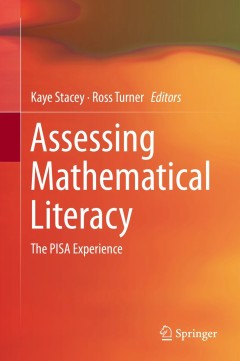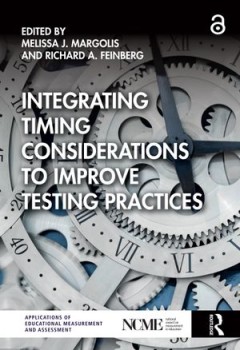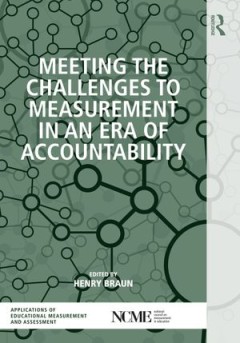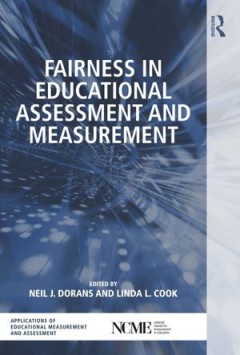Filter by

Assessment for Learning: Meeting the Challenge of Implementation
This book provides new perspectives on Assessment for Learning (AfL), on the challenges encountered in its implementation, and on the diverse ways of meeting these challenges. It brings together contributions from authors working in a wide range of educational contexts: Australia, Canada, England, Germany, New Zealand, Norway, Israel, Philippines, Scotland, Spain, Sweden, Switzerland, the Unite…
- Edition
- Ed. 1
- ISBN/ISSN
- 978-3-319-39211-0
- Collation
- XXIV, 363
- Series Title
- The Enabling Power of Assessment
- Call Number
- 371.26 ASS a

Assessment for Learning Within and Beyond the Classroom: Taylor’s 8th Teach…
These conference proceedings focus on “Assessment for Learning: Within and Beyond the Classroom” in recognition of the power of assessment for learning as a way of boosting student performance. They explore the breadth, depth and quality of the best models and practices, strategies, lessons learnt and discuss cases of successful implementation of assessment within the classroom and beyond, …
- Edition
- Ed. 1
- ISBN/ISSN
- 978-981-10-0908-2
- Collation
- X, 446
- Series Title
- -
- Call Number
- 371.26 ASS a

Assessment and Teaching of 21st Century Skills: Methods and Approach
This second volume of papers from the ATC21STM project deals with the development of an assessment and teaching system of 21st century skills. Readers are guided through a detailed description of the methods used in this process. The first volume was published by Springer in 2012 (Griffin, P., McGaw, B. & Care, E., Eds., Assessment and Teaching of 21st Century Skills, Dordrecht: Springer). The …
- Edition
- Ed. 1
- ISBN/ISSN
- 978-94-017-9395-7
- Collation
- XII, 310
- Series Title
- Educational Assessment in an Information Age
- Call Number
- 371.26 ASS a

Assessing Young Learners of English: Global and Local Perspectives
This volume documents international, national, and small-scale testing and assessment projects of English language education for young learners, across a range of educational contexts. It covers three main areas: age-appropriate ‘can do statements’ and task types for teaching and testing learners between the ages of 6 to 13; innovative approaches to self-assessment, diagnostic testing, self…
- Edition
- Ed. 1
- ISBN/ISSN
- 978-3-319-22422-0
- Collation
- XII, 338
- Series Title
- Educational Linguistics
- Call Number
- 370.15 ASS a

Proceedings of the 21st Conference on Formal Methods in Computer-Aided Design…
The Conference on Formal Methods in Computer-Aided Design (FMCAD) is an annual conference on the theory and applications of formal methods in hardware and system verification. FMCAD provides a leading forum to researchers in academia and industry for presenting and discussing groundbreaking methods, technologies, theoretical results, and tools for reasoning formally about computing systems. FMC…
- Edition
- -
- ISBN/ISSN
- 9783854480464
- Collation
- -
- Series Title
- -
- Call Number
- -

Assessing Mathematical Literacy: The PISA Experience
This book describes the design, development, delivery and impact of the mathematics assessment for the OECD Programme for International Student Assessment (PISA). First, the origins of PISA’s concept of mathematical literacy are discussed, highlighting the underlying themes of mathematics as preparation for life after school and mathematical modelling of the real world, and clarifying PISA’…
- Edition
- Ed. 1
- ISBN/ISSN
- 978-3-319-10121-7
- Collation
- XXI, 321
- Series Title
- -
- Call Number
- 379.1 ASS a

Preparing Students for College and Careers : Theory, Measurement, and Educati…
Preparing Students for College and Careers addresses measurement and research issues related to college and career readiness. Educational reform efforts across the United States have increasingly taken aim at measuring and improving postsecondary readiness. These initiatives include developing new content standards, redesigning assessments and performance levels, legislating new developmental e…
- Edition
- -
- ISBN/ISSN
- 9781317221616
- Collation
- 204 halaman
- Series Title
- -
- Call Number
- 370 PRE

Integrating Timing Considerations to Improve Testing Practices
Integrating Timing Considerations to Improve Testing Practices synthesizes a wealth of theory and research on time issues in assessment into actionable advice for test development, administration, and scoring. One of the major advantages of computer-based testing is the capability to passively record test-taking metadata—including how examinees use time and how time affects testing outcomes. …
- Edition
- -
- ISBN/ISSN
- 9781351064767
- Collation
- 200 halaman
- Series Title
- -
- Call Number
- 370 INT

Meeting the Challenges to Measurement in an Era of Accountability
Under pressure and support from the federal government, states have increasingly turned to indicators based on student test scores to evaluate teachers and schools, as well as students themselves. The focus thus far has been on test scores in those subject areas where there is a sequence of consecutive tests, such as in mathematics or English/language arts with a focus on grades 4-8. Teachers i…
- Edition
- -
- ISBN/ISSN
- 9781135040154
- Collation
- 436 halaman
- Series Title
- -
- Call Number
- 370 MEE

Fairness in Educational Assessment and Measurement
The importance of fairness, validity, and accessibility in assessment is greater than ever as testing expands to include more diverse populations, more complex purposes, and more sophisticated technologies. This book offers a detailed account of fairness in assessment, and illustrates the interplay between assessment and broader changes in education. In 16 chapters written by leading experts, t…
- Edition
- -
- ISBN/ISSN
- 9781317684671
- Collation
- 328 halaman
- Series Title
- -
- Call Number
- 370 FAI
 Computer Science, Information & General Works
Computer Science, Information & General Works  Philosophy & Psychology
Philosophy & Psychology  Religion
Religion  Social Sciences
Social Sciences  Language
Language  Pure Science
Pure Science  Applied Sciences
Applied Sciences  Art & Recreation
Art & Recreation  Literature
Literature  History & Geography
History & Geography